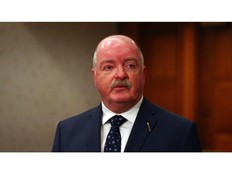First Nations put hand up on eel fishery slated for closure
Wolastoqey Nation responds a day after the federal fisheries minister warns she might cancel the season because of rampant poaching

Article content
The Wolastoqey Nation says the only way to ensure a safe and sustainable baby eel fishery is to let Indigenous people lead its management and protection.
The Nation, which represents the Indigenous chiefs of the six communities that hug the St. John River, or Wolastoq, issued a statement Wednesday in reaction to a letter sent the day before by federal fisheries minister Diane Lebouthillier, who told 12 baby eel, or elver, licence holders in New Brunswick and Nova Scotia she was probably going to suspend the fishery this season.
It was set to begin in only six weeks.
“As acknowledged by the minister of the Department of Fisheries and Oceans, our Nation’s lack of access to the elver fishery continues to be a serious problem,” the statement read. “The only way forward for a sustainable and safe elver fishery is for access, supported by DFO and Canada, that respects the inherent and treaty-protected rights of Wolastoqey.”
The minister said in her letter she was willing to listen to feedback from the licence holders for American eels before making a final decision and has asked them to reply by Feb. 23. Nine of the licence holders are commercial, and three of them belong to Indigenous communal groups.
Last year, the Department of Fisheries and Oceans, or DFO, ended the season early, only two weeks in, after it was faced with an unprecedented number of reports – more than 1,550 – of poaching on rivers where the baby eel float in from the ocean.
The brazen attempts to plunder the rivers came as prices for baby eels – which are raised to adulthood in tanks in Asia before being sold for numerous dishes – hit as high as $5,000 a kilogram. Prices have skyrocketed as eels around the world have become scarcer. It is now the most valuable seafood export from Canada.
We continue to advocate with DFO that our inherent aboriginal and treaty-protected rights be respected and accommodated.
Wolastoqey Nation
The poaching, driven by organized crime, largely occurs at night on dozens of rivers in the Maritimes over a vast area, making enforcement difficult.
Commercial harvesters in Nova Scotia reacted angrily to the news, arguing DFO had wasted 10 years in failing to enact stricter rules and beef up enforcement.
The Wolastoqey Nation said Wednesday that existing monitoring was not enough to manage the conservation and protection of the baby eels and ensure people’s safety.
But it also blamed Ottawa for prioritizing non-Indigenous commercial fishing interests at the expense of what it called the inherent fishing rights of First Nations.
“Our position remains that there be an Indigenous-led elver fishery based on enhanced monitoring of the species including dedicated funding to continue our eel index/assessment work in the Wolastoq,” the organization wrote. “We continue to advocate with DFO that our inherent aboriginal and treaty-protected rights be respected and accommodated.”











Postmedia is committed to maintaining a lively but civil forum for discussion. Please keep comments relevant and respectful. Comments may take up to an hour to appear on the site. You will receive an email if there is a reply to your comment, an update to a thread you follow or if a user you follow comments. Visit our Community Guidelines for more information.